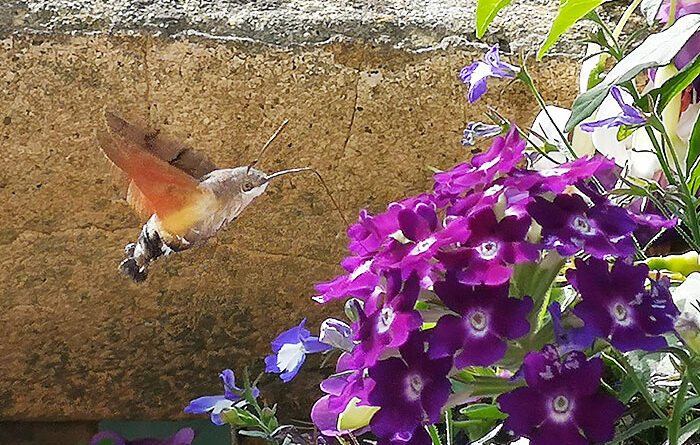Turf wars: the battle against plastic grass
- Turning the Wight’s blue rinse tide into a sea of red - 20th August, 2024
- Are you emergency ready? - 20th June, 2024
- Will YOUR face fit in the digital future? - 17th June, 2024
Back in spring 2019, horrified by the unimaginable loss of invertebrate biomass, I wrote in praise of minibeasts, and their vital place in the ecosystem. I proclaimed that we could all do our bit, and pledged to revive my perished balcony. I decommissioned all the dusty pots bristling with parched and miserable twigs, and invested in some bigger water-retaining troughs. I figured, if I plant it, they will come.
And come they did. My outdoor spot is now a riot of enticing flowers; year-round osteospermums, hardy roses, elegant verbena and, in the window boxes, violas with faces like kittens. I watch with delight as flying pollinators buzz down for a sip of nectar. A hummingbird hawk moth is a regular visitor; hovering while its ridiculously long and agile tongue tickles my rosebud.
But it’s not all fluttering beauties. My solar fountain is a nursery for thousands of wiggly mosquito larvae. Wasps perch on its edge; patterned faces lapping at the cool water. Ants have dominion; farming aphids on the stems of lupins til they are encrusted with them, suckling out sap and secreting sugary honeydew. In the dank depths of the containers burrow centipedes, woodlice and worms. I am honoured to provide habitat for them all.
So it amazed me when listening to BBC Radio 4’s Gardeners’ Question Time, how so many of these haughty-culturalists began their question with the words, “How do I get rid of..?” I’m no Titchmarsh, but I’d say enjoy the mistletoe, fungi and moss. Admire that ‘pest’ and ‘weed’ for being tenacious enough to live or grow in the ‘wrong’ place – it’s only wrong for you.
But if you really hate your garden and every living thing in it, the artificial grass business – an offshoot of the fossil fuel industry – is peddling a quick and sterile fix for your outside space. At first glance, covering your yard with green plastic might seem like a neat solution. After all, we have been programmed to admire a trimmed and tidy lawn, with whole industries dependent on us buying liquid conditioners, expensive machinery and herbicides – and it’s daunting.
In addition to the cost of the tragic carpet, laying it requires levelling materials, underlay, pegs, adhesive and joining tape. And, after the expense of installation, a synthetic garden is not maintenance-free.
In the summer, as the pseudo sward heats – not cools – your naked toes, you can simulate the sweet smell of freshly-mown grass by squirting a synthetic aroma over the plastic blades – which, by the way, might need combing back into erectness. Meanwhile, underneath, having been starved of oxygen, are the stinking rotting corpses of worms and other invertebrates. Better have another spray of that lawn deodorant.
Ersatz turf has no climate benefits, no nutritional value for soil, plants nor animals. It doesn’t soak up moisture, and releases microplastics into the environment. Even its advocates say it might fade, melt or need disinfecting – even vacuuming.
Yes, I have ants in my plants, but at least my garden is alive.
This article first appeared in print in the Isle of Wight County Press on 16 December 2022 and also online.


